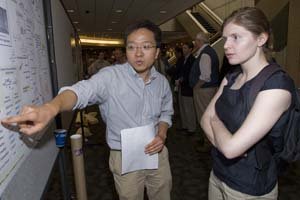Mar 30 2010
Poster titles are now being accepted for Johns Hopkins Institute for NanoBioTechnology's fourth annual symposium, "Environmental and Health Impacts of Engineered Nanomaterials" set for Thursday, April 29, at the Bloomberg School of Public Health. Researchers from across the university, from government and industry, and from other universities are invited to submit posters by the deadline of April 22.
 2009 INBT Poster Session (Photo: Jon Christofersen)
2009 INBT Poster Session (Photo: Jon Christofersen)
All students, faculty and staff affiliated with any Johns Hopkins campus or school may attend the symposium for free. Students from UMBC and Morgan State University may also attend at no cost.
This year's symposium brings together faculty experts engaged in various aspects of nanotechnology risk assessment and management research. Jonathan Links, an INBT-affiliated professor in the Department of Environmental Health Sciences at the Bloomberg School, assembled the slate of speakers from across four divisions of the university.
Links said that this diversity reflects the multidisciplinary approach needed to effectively address questions of how nanomaterials move through and interact with the environment, and how they may impact biological organisms, including humans. Links added that despite some concerted efforts to assess risk, many questions remain unanswered about how engineered nanomaterials and nanoparticles impact human health and the environment.
"Without these data, we are flying blind. But when risk assessment is performed in tandem with research into beneficial applications, it helps researchers make better decisions about how nanotechnology is used in the future," Links said.
Along with Links, professors from the Bloomberg School presenting talks at the symposium include Ellen Silbergeld, of Environmental Health Sciences, and Patrick Breysse, of Environmental Health Engineering and Environmental Health Sciences. William P. Ball, a professor in the Whiting School of Engineering's Department of Geography and Environmental Engineering; Justin Hanes, a professor in the School of Medicine's Department of Ophthalmology, with joint appointments in the Whiting School's Department of Chemical and Biomolecular Engineering and the Bloomberg School's Department of Environmental Health Sciences; and Howard Fairbrother, a professor in the Krieger School of Arts and Sciences' Department of Chemistry, will talk about the transport of nanomaterials through environmental and biological systems, as well as the unusual properties of manufactured nanomaterials.
Tomas Guilarte, recently appointed chair of the Department of Environmental Health Sciences at Columbia University's Mailman School of Public Health and a former professor at the Bloomberg School, will provide a presentation on neurotoxicity of nanoparticles. Ronald White, an associate scientist and deputy director of the Bloomberg School's Risk Sciences and Public Policy Institute, will discuss policy implications based on risk assessment.
Symposium talks will be from 8:30 a.m. until noon in Sheldon Hall (W1214), and a poster session, with prizes for top presenters, will be held from 1:30 to 3 p.m. in Feinstone Hall (E2030).
To register for the symposium or to display a poster, click here.
For more information about INBT's fourth annual symposium, click here.